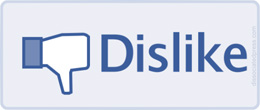
When you’re in business, not everyone will like what you have to say. If you like to be liked (as I do), this sort of stinks.
But there’s another way to think of this. Having a strong point of view means that someone (or maybe a lot of people) won’t agree with you. They may go so far as to not even like you. And this is fantastic, because it means that you are about something.
I’ve been winding around to this conclusion for a while, but it really crystallized for me a few days ago when I read Sally Hogshead’s short-but-mighty essay “Here’s to the Haters” in End Malaria. (Side note: if you haven’t bought this book yet, do it. It’s a concrete cause — $20 of every book sold goes to buying mosquito nets to prevent malaria — and the essays in the book are fantastic. In fact, I’m putting it out there to the universe that my BIG DREAM is to be involved with a project like this in the future.)
Anyway, back to Sally, who writes: “If you’re not eliciting a negative response from someone, then you’re probably not very compelling to anyone.”
I believe this 100 percent, and I even wrote about it in my eBook (in my chapter about crafting your point of view), but the reminder is timely, for a few reasons.
First, as a strategic partner, a huge part of my job is to help my clients express their point of view, which often means they have to step outside of their comfort zone. My job isn’t to make every single person in the world fall in love with them. Rather, my job is to make sure their point of view is clear enough (and expressed in the right way — which, for me, means telling a story) that their ideal client will fall in love with them. So really, my job is to make sure that someone disagrees.
Secondly, keeping that dislike = compelling equation in my back pocket keeps me on track, especially when things start to feel personal. For example, some of you know that I wrote a book about sewing last year, called Sew Retro. It’s all about the history of women and sewing, with retro-inspired projects for each decade.

Do you know the main thing that’s different about being a book author today versus 20 years ago? Two words: Amazon reviews. Anyone with access to a computer can go onto Amazon and write a review of your book — the piece of work you slaved over for a year, from negotiating the publishing contract to researching, writing, re-writing, and illustrating. In just a few sentences, they get to pass judgment on your book, and the whole world can read it. As a reader, this is terrific.
But as an author, it’s a little bit horrible.
So, when a few people started to post negative reviews of Sew Retro, I started to crumble. I suck, I’m unqualified, I’m dumb, I thought (yes, even optimists like me fall into self-critical despair from time to time). The reviews that were constructive didn’t sting so much. But the few where the readers just so completely didn’t get it, where they had their own agenda and system of beliefs about women and women’s history, and really, really didn’t like my point of view? Those reviews hurt, and they felt unfair.
And then, one day this past spring, it hit me: the fact that people could so fundamentally not get it, could disagree, and could 100 percent not like the book meant that it truly was about something. It had a point of view. It moved. It did something. And because it didn’t connect with everyone, that meant that it definitely did connect with someone — the people I wrote it for.
There’s a great business lesson here: don’t let fear of criticism force you into creating a boring web site and marketing collateral. In fact, when is the last time you thought about your point of view? When is the last time you had a good argument about it? Have one today, and you’ll see what I mean.
Comments
Posted by Beverly Smolyansky on 09/21/11 6:45pm
Judi, I completely agree. When I used to teach intro psychology, I would have people tell me they "hated" Freud or Jung or one of the early theorists. I told them that was the point! If they had "middle of the road" opinions, who would have noticed them? You have to be extreme for people to recognize you as different. Some will disagree and propose a counter argument. That is progress! That is exciting!
Posted by admin on 09/21/11 7:03pm
Bev, that's a great example! Thanks for sharing!
Best,
Judi
Posted by Hogshead means | Zvision3d on 09/22/11 8:52am
[...] Why It's Important to be Disliked | judiketteler.com [...]
Posted by Sometimes You Build An Art Deco Masterpiece, and Sometimes You Miss | judiketteler.com on 02/23/12 1:53am
[...] about putting something out there with a point of view that someone doesn‚Äôt like. As I‚Äôve written about before, that’s a good thing. A bad Amazon review isn‚Äôt a miss. I‚Äôm also not talking about doing [...]
Posted by eileen on 06/13/12 8:32pm
I love that you wrote this article. I realized that if an Amazon review lists "grammatical errors, spelling errors, incoherent, etc." I probably won't look at the book; however, if someone strongly disagrees with it, there's some truth in it, and this is from where the negative reaction stems. Since I'm so anti-status quo, a negative review usually prompts me to read more.
Posted by Homepage on 07/26/12 5:51pm
... [Trackback]...
[...] Read More: judiketteler.com/why-its-important-to-be-disliked [...]...

